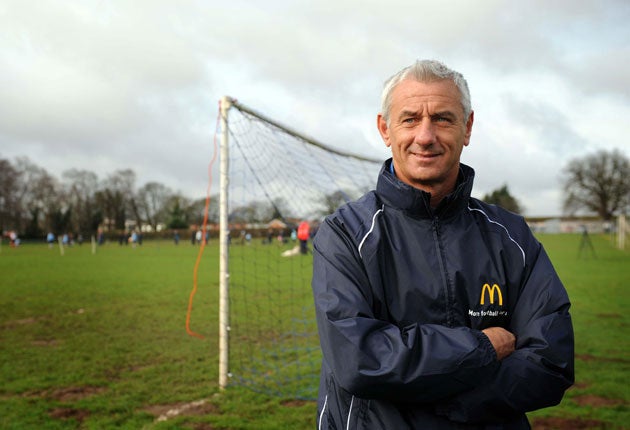Rush calls upon Wales to revive the spirit of '84

Your support helps us to tell the story
From reproductive rights to climate change to Big Tech, The Independent is on the ground when the story is developing. Whether it's investigating the financials of Elon Musk's pro-Trump PAC or producing our latest documentary, 'The A Word', which shines a light on the American women fighting for reproductive rights, we know how important it is to parse out the facts from the messaging.
At such a critical moment in US history, we need reporters on the ground. Your donation allows us to keep sending journalists to speak to both sides of the story.
The Independent is trusted by Americans across the entire political spectrum. And unlike many other quality news outlets, we choose not to lock Americans out of our reporting and analysis with paywalls. We believe quality journalism should be available to everyone, paid for by those who can afford it.
Your support makes all the difference."In Rush they are armed with the most dangerous marksman in Britain." The Times was confident of the threat facing England when they visited Wales for their final meeting in the British Home Championship on 2 May 1984. After all, Ian Rush was that season's First Division top-scorer with 32 goals for the champions Liverpool. Yet Wales's last win over their old foe came via the head of a 20-year-old debutant called Mark Hughes.
Looking back on that 1-0 victory Rush remembers taking Hughes, also from North Wales, under his wing – "Mark was very quiet" – yet there was no need to worry about the Manchester United striker once he pulled on the red shirt. "On the pitch he was completely different and anyone who messed with him found out what happened."
Wales were not to be messed with in those days either. Bobby Robson's England were weakened by injuries – only Peter Shilton, Ray Wilkins and Tony Woodcock were regulars – but Mike England's men were a match for most at Wrexham's intimate Racecourse Ground: Spain succumbed 3-0 the next year with Hughes unleashing a spectacular scissors kick.
"We felt if we were going to beat the top teams like England it'd be on the smaller grounds where the crowd could get behind us," recalls Rush, one of the Merseyside-based contingent with Everton's Neville Southall and Kevin Ratcliffe.
"Even when we were injured we'd turn up because we felt we were going somewhere. Mike England knew how to get the team bonded and we had some great players." Such was the bond that Rush took lifts into training at Liverpool in Everton captain Ratcliffe's car. Southall, a fellow passenger, was "the best goalkeeper in the world without a doubt for about five years".
David Phillips, like Hughes, made his debut against England and concurs about the quality in that squad. "The spine was exceptional. Rushie, Sparky [Hughes], Rats and Nev could have played for most international sides," says the then Plymouth Argyle player.
Phillips, whose son Aaron represents Wales Under-16s, recalls the "ecstatic feeling when the final whistle went", confirming the fourth victory over England since World War Two – and sweetly timed given England's wish to do away with the Home Championship.
Sixteen months later, the feeling was very different. With Wales leading Scotland 1-0 in their final 1986 World Cup qualifier at Ninian Park, Phillips was penalised for handling when David Speedie kicked the ball at him from close range. The penalty just beat Southall and Scotland, not Wales, were Mexico-bound. "I just raised my arms to protect myself," Phillips says.
For Rush, the Welsh FA's elite performance director as well as coaching Liverpool's strikers, his "only regret" in the game was not playing in a major tournament with Wales.
They had missed Argentina 78 after Joe Jordan's handball won Scotland a penalty in a vital qualifier at Anfield; then in 1993, Paul Bodin's failed spot-kick at 1-1 in a must-win USA 94 qualifier saw them lose to Romania. "There've been three penalties," says Rush. "Two penalties that were not penalties and they scored, and the one where we played against Romania where we had a penalty and didn't score."
Wales will almost certainly not reach Euro 2012 after three defeats but Rush hopes for a positive result against England to provide a springboard for Gary Speed. The new manager has "three match-winners" in Gareth Bale, Craig Bellamy and Aaron Ramsey but his squad need "a bit of Welsh passion".
"Under John Toshack they played football but sometimes maybe too much football. With a full house at the Millennium, if we can produce the fighting spirit like the rugby team and get a result the Welsh public will say, 'Hang on, it's worth coming back to watch a game'."
At the Millennium Stadium, the spirit of rickety Racecourse could be the key, Rush adds. "We worked really hard for what we got and that's what Wales have to do."
Join our commenting forum
Join thought-provoking conversations, follow other Independent readers and see their replies
Comments